Published in Nacional number 642, 2008-03-03
EXCLUSIVE: HASSAN FADAIFARD
Iranian gas for the EU by way of Croatia
IRANIAN AMBASSADOR Hassan Fadaifard is offering Croatia participation in the delivery of gas to Austria, worth 25 billion dollars, and to Switzerland, worth 30 billion, by way of its terminals and gas pipelines
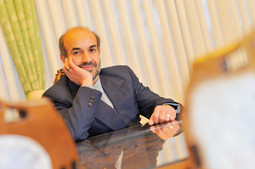 Iranian Ambassador to Croatia Mohammad Hassan Fadaifard On Tuesday 26 February Iranian Ambassador to Croatia Mohammad Hassan Fadaifard visited Rijeka and the Primorje-Gorski Kotar County Prefect Zlatko Komadina. During the one-hour meeting, Fadaifard outlined energy projects that Iran has recently hammered out with EU member states: Iran will deliver 25 billion dollars worth of gas to Austria, and a 30 billion dollar deal with Switzerland is also to be signed. Both contracts could be interesting because of the possibility that the route Iranian gas would take to the heart of Europe would go by way of Croatia. The Iranian ambassador acquainted the Primorje-Gorski Kotar County Prefect about this possibility, and in an exclusive interview for Nacional described the potential cooperation between Croatia and Iran in the field of energy and commented possible obstacles to better cooperation between the two countries.
Iranian Ambassador to Croatia Mohammad Hassan Fadaifard On Tuesday 26 February Iranian Ambassador to Croatia Mohammad Hassan Fadaifard visited Rijeka and the Primorje-Gorski Kotar County Prefect Zlatko Komadina. During the one-hour meeting, Fadaifard outlined energy projects that Iran has recently hammered out with EU member states: Iran will deliver 25 billion dollars worth of gas to Austria, and a 30 billion dollar deal with Switzerland is also to be signed. Both contracts could be interesting because of the possibility that the route Iranian gas would take to the heart of Europe would go by way of Croatia. The Iranian ambassador acquainted the Primorje-Gorski Kotar County Prefect about this possibility, and in an exclusive interview for Nacional described the potential cooperation between Croatia and Iran in the field of energy and commented possible obstacles to better cooperation between the two countries.
NACIONAL: You have been in Croatia since November of 2006. What have you been involved in during your mandate? - As an ambassador I have a mandate to cooperate with the Croatian authorities at the national level on the level of bilateral cooperation between our two nations. It is also my wish to travel across Croatia and establish cooperation with the various counties. It is my wish to also develop political, economic and cultural ties with the counties, to create links between Croatian counties and some Iranian provinces. That was my goal in visiting Primorje-Gorski Kotar County. I met County Prefect Komadina and his associates; we discussed the possibilities of establishing cooperation in various fields. Prior to visiting Rijeka I had already toured some other counties.
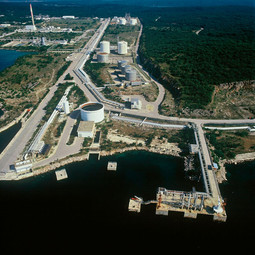 THE TERMINALS in Rijeka and on the island of Krk could transform Croatia into a key EU supplier NACIONAL: What are the areas of possible cooperation that you discussed with County Prefect Komadina?
THE TERMINALS in Rijeka and on the island of Krk could transform Croatia into a key EU supplier NACIONAL: What are the areas of possible cooperation that you discussed with County Prefect Komadina?
- There are many: fisheries, shipbuilding, tourism, energy related to oil and gas, petrochemical production and port cooperation. Rijeka is one of Croatia's most important ports, and we have similar ports in Iran, so that there is a significant possibility for cooperation. Some of our areas also have great geographic similarity, which makes the possibility of establishing good relations and direct cooperation all the more emphasised. By way of the county's development agency I received much useful information on the economic potential of the region.
NACIONAL: What concrete cooperation projects have you discussed?
- As far as tourism is concerned, we can cooperate in two directions: that Croatians travel to Iran and the Iranians travel to Croatia. As far as I know Croatia was last year visited by 11 million tourists from many countries, which means that you have great experience in tourism. We could exchange experiences in this regard. Another area of cooperation I see in joint investment in various areas. Our country is open to all countries looking to invest in our economy. As far as shipbuilding is concerned, we have this branch in our country, but import some of our needs from third countries. We have seen that there is the 3. maj shipyard in Rijeka with which we could cooperate quite intensively. Croatian shipyards could produce some more complex ship parts for us, such as motors. There is also a lot of room for cooperation in fisheries. With an exchange of technical delegations from both countries we could define more precisely all of the possible areas of cooperation. We have proposed that a Croatian delegation be set up to visit Iran and study our potential and possibilities at the local level. We have invited County Prefect Komadina to visit Iran. We are also working on having our local experts visit Croatia as soon as possible.
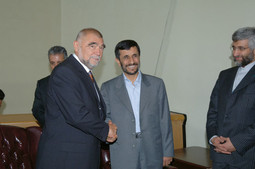 CROATIAN PRESIDENT Stjepan Mesić during his meeting with Iranian President Mahmoud Ahmadinejad NACIONAL: Your meeting in Rijeka was nevertheless marked by the announcement of a big energy deal with Austria. What would Croatia's role be in this?
CROATIAN PRESIDENT Stjepan Mesić during his meeting with Iranian President Mahmoud Ahmadinejad NACIONAL: Your meeting in Rijeka was nevertheless marked by the announcement of a big energy deal with Austria. What would Croatia's role be in this?
- Croatia is located on the territory of Europe which will certainly over the coming 20 years have great concern over energy shortages. Iran, i.e. the region we are in, is the world's largest source of energy. 60 percent of the world's need for oil and gas is met from supplies in the Persian Gulf. Iran is the second country in the world by its gas and oil reserves. In the future Iran might play a very significant role at the global level. Over the past eight years 200 billion dollars of foreign investment has come into Iran. Most of these investments have come from western countries, Japan and China. Of the European countries I would single out Great Britain, Italy, Germany and France. The deal we have concluded with Austria is worth 25 billion dollars, and so we should distribute Iranian gas in Europe over the coming 20 years. The deal has just been signed, its implementation has not yet started, and it will take 4-5 years before it does. To be honest, I do not know what kind of role Croatia intends to have in it all. I think it could have an exceptionally important and beneficial role: this gas could be delivered to Austria by way of Croatian land and sea, from which your country could benefit. The fact that Croatia already has very good experience in the oil industry is not unimportant, and the distribution of oil and gas by way of Croatia could allow your country to resolve a significant part of the supply and distribution of these sources of energy for your own needs. A similar gas supply deal is to be concluded soon with Switzerland, and the value of the deal is in excess of 30 billion dollars.
NACIONAL: What are the conditions needed in Croatia to get on board the project? The construction of LNG terminals, oil pipelines, ...?
- I cannot say exactly what Croatian officials should do to get involved in the project, but I do know that Croatia can have a role. One of these things is to expand its oil terminals, another possibility is having oil and gas pipelines. I have heard that there is a possibility that Austria could use an LNG terminal that would be built somewhere in Croatia, and as far as I know the terminal on the island of Krk is the most promising option. I feel that in this project too Croatia can play a significant role, but it must itself determine the method and scope, because each country best knows its own priorities. The key thing is that Europe will have a great need for energy, and that it comes from the Middle East. And Croatia is located right in the middle. There are other routes through which this energy could come to Europe, but it is undisputable that Croatia is located on the middle of this route. And this fact should be capitalised on.
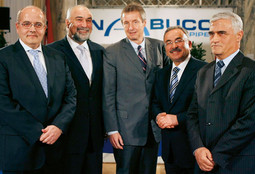 SIGNING OF THE NABUCCO PROJECT in Vienna in February: Gabor Diossy, Varujan, Vosganian, Martin Bartenstein, Hilmi Guler and Petar Dimitrov NACIONAL: Besides Rijeka, you have visited some other counties over the past months, and there is likely cooperation at the national level. How is the cooperation between Croatia and Iran to date?
SIGNING OF THE NABUCCO PROJECT in Vienna in February: Gabor Diossy, Varujan, Vosganian, Martin Bartenstein, Hilmi Guler and Petar Dimitrov NACIONAL: Besides Rijeka, you have visited some other counties over the past months, and there is likely cooperation at the national level. How is the cooperation between Croatia and Iran to date?
- I am not entirely satisfied with the current economic cooperation because I feel that the possibility of cooperation is much greater than what currently exists. Our cooperation amounts to 10 million dollars, and Iran is a country with a population of 70 million, so that our cooperation is only symbolic. I feel that it could be much greater. I understand the desire of Croatian officials and the Croatian people for integration and accession to the EU. The desire and will for European integration is not opposed to the possibility of cooperating with third countries that already have relations with other European countries. This is best confirmed by this deal with Austria.
NACIONAL: Do you feel that there are those in Croatia who are not partial to cooperation with Iran?
- Some countries that do not have a mature relationship with Iran or have some other issues are exerting pressure on other countries to not cooperate with Iran. Their goal is not Iran, to put pressure on Iran, rather their goal is the country on which there are exerting pressure. There are two reasons behind this: one is that they do not give that country an opportunity to develop relations with others, but that it be dependant only on the one that is exerting pressure on it. The second is to preserve its future market in Iran, so that somebody else does not get into Iran before they do so in the future. The goal is to one day, when there is a resumption of political and economic ties with Iran, that they be the first to enter the Iranian market. The entire time they are falsely presenting this pressure as some kind of limiting of Iran. A state of this size and this population size and the enormous resources that Iran has just in oil and gas cannot be destroyed by some kind of temporary pressure. The experience of the past 30 years has proven this, because immediately following the Islamic revolution we came under American sanctions, which were then joined by some western countries. In spite of it all we managed to defend ourselves during eight years of war without any foreign aid. At the same time we have introduced training in various fields of science, so that we are by no means a small and weak state. We have our successes in the fields of medicine, nanotechnology, nuclear energy, oil and gas, but also in space science.
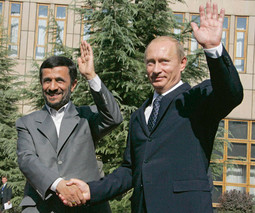 RUSSIAN PRESIDENT Vladimir Putin during a visit to Teheran in October of 2007 with Iranian President Mahmoud Ahmadinejad This has been made possible by our own economic resources, which are our country's true wealth. Just last year we had 75 billion dollars in exports and 51 billion in imports, which means we had a surplus of about 25 billion dollars. Fifty percent of our population are people under the age of 30, so that we are a very young nation. A state with these kinds of characteristics truly has no reason to fear for its future. Unfortunately, there are those who continue to wish to fight us and our independence, and one of their methods is to put pressure on other countries to not cooperate with us. And that then does not hurt us, but rather these countries. Every country that cooperates with us can benefit from this cooperation, because we produce 4.2 million barrels of oil a day, and export 2.5 million of that. Our oil industry is completely independent and completely open for cooperation, especially with developing states, which we have already indicated to Croatian politicians and business people. And we are very much aware that economic cooperation presumes securing the interests of both sides.
RUSSIAN PRESIDENT Vladimir Putin during a visit to Teheran in October of 2007 with Iranian President Mahmoud Ahmadinejad This has been made possible by our own economic resources, which are our country's true wealth. Just last year we had 75 billion dollars in exports and 51 billion in imports, which means we had a surplus of about 25 billion dollars. Fifty percent of our population are people under the age of 30, so that we are a very young nation. A state with these kinds of characteristics truly has no reason to fear for its future. Unfortunately, there are those who continue to wish to fight us and our independence, and one of their methods is to put pressure on other countries to not cooperate with us. And that then does not hurt us, but rather these countries. Every country that cooperates with us can benefit from this cooperation, because we produce 4.2 million barrels of oil a day, and export 2.5 million of that. Our oil industry is completely independent and completely open for cooperation, especially with developing states, which we have already indicated to Croatian politicians and business people. And we are very much aware that economic cooperation presumes securing the interests of both sides.
NACIONAL: What is the annual exchange with EU member states? - Last year it was 25 billion euro, over 5 billion euro with Germany for example.
NACIONAL: How is your cooperation with Croatian Government? Do you feel that there is pressure on Croatia to not cooperate with Iran?
- We do not have open political issues with Croatia. We have had state visits by our presidents, Mr. Mesić visited Iran during his first mandate, and our former president visited Croatia. Of course, the US puts pressure on every country it can. How much it has pressured Croatia, I do not know.
NACIONAL: What is your message to Croatian business people and politicians in the context of economic cooperation?
- That they view Iran with their own eyes and their own perception, and not from the perception of someone else offering their own point of view. You know, superpowers have only their own interests in mind and work hard to turn other countries to their own interests.
Croatia lacks an energy strategy
For as long as the state sets the price of energy, there will be no investment in Croatia into that sector say experts. Like in other aspects, Croatian Government is behind the curve in the area of energy, says Nacional's source in the energy sector. That is evident in the way Croatian Government is unprepared in receiving the Iranian proposal to cooperate in the transport of liquefied gas to Austria by way of Croatia, for which Croatia needs to build an LNG terminal on the Croatian coast. At the same time many European countries have for years been developing projects that should secure their energy stability. One of the key strategies of most of these countries is their independence of energy sources from a single direction, from Russian for example, as energy routes are often liked to changeable political relations. That is why it is no surprise that Austria's OMV launched the Nabucco gas pipeline project a few years ago that is to run from Turkey to Austria and pass through EU member countries Bulgaria, Romania and Hungary. At the same time, in early February, a meeting was held in Brussels where a deal was worked out to found a joint consortium for the construction of a Pan-European oil pipeline, with partner countries to be Serbia, Croatia, Italy and Romania. Ever stronger calls for the construction of an LNG terminal on the Croatian coast have also been encouraged by the project that would see Iranian liquefied gas shipped to Croatia by sea and then by gas pipeline to Austria. Many, however, feel that the Croatian authorities are delaying with an integral energy strategy that would include a ranking of energy priorities and defined goals that Croatia would aim to achieve.
One of the leading energy field experts gave Nacional an opinion of the state of the Croatian energy sector and an evaluation of several projects that have been discussed in the public recently. "Energy fits into the story that Croatia decides all sorts of things at the declarative level, but that things are lagging at the level of implementation. What arises from that is that Croatia does not have a realistic economy. There is no realistic price of gas, electricity, HEP (the national electric power authority) is on its knees, four years have been lost on gas and nothing has been done in that regard. A situation like the one in Communism has been created – the state controls the price of energy, and there is no investment in these conditions. No one is willing to invest and to lose money – there are no fools of that ilk. If this is linked to the problem that Croatia reacts slowly to everything, this problem generates a blockade and nothing gets resolved", says Nacional's source.
Regarding the project that the Iranian ambassador to Croatia presented to Primorje-Gorski Kotar County Prefect Zlatko Komadina, Nacional's expert source points out: "As far as oil and gas goes, it is important that there be more than a single source it is procured from. That is why the Iranian gas project would certainly be beneficial for Croatia. That would create a balance in the situation caused by Russian gas also from that basin, and if domestic production is added to that, then Croatian would be relatively secure as regards energy. In the field of energy it is key to always take into calculation that each supply route has some political dimension and political risk. The basic problem of bringing gas into the region is that no one country can resolve it on its own, meaning that all gas pipelines that go to Europe pass through several countries, and there is, of course, the problem of sorting out the interests. There are always the issues of those investing, and these are energy companies, and not countries, and they have their own specific plans and dynamics. The EU should also have a more significant presence in implementing all of these supply routes because the security of European supply is at issue. No one country could independently resolve these issues."
In the opinion of many energy experts, the issue of energy in Croatia is still approached lightly by many, without consideration of the consequences. "Energy is from day to day an issue of growing importance, because it has never before had as many limitations as climate change will impose in the near future. Up to now things were resolved with much greater simplicity, but now we are for the first time entering a situation where limits will be set for the entire energy sector, which means that the sector will be much more hard pressed to find solutions to meet energy needs. And every solution presumes a well-organised state, the ability to invest new technologies, the ability for efficient implementation. We are entering a very demanding period in which the issue of energy will be the dominant one.
Energy and ways to address these issues will be discussed every day. And in Croatia we have not even resolves the prehistoric issues others have long ago dealt with. And that is that you have to have a real economy, that investments into energy need to return a profit, that there is no such thing as social energy policy. Until these issues are resolved we will not have a single significant project in Croatia. As far as announcements regarding the need for nuclear energy go, it is quite clear that Croatia needs a nuclear power plant, the only question is where to build it and how. The European Union has very ambitious projects, but it is also a question as to how truly realistic they are. If Croatia is going to have to take on obligations to reduce consumption, reductions and renewable sources of energy, then these are massive obligations that have to be implemented – the restructuring of our own energy sector in order for it to be able to carry out these obligations. This is no longer a matter of declarations, but rather of a deep-reaching operation for which Croatia needs very much to prepare itself", concludes Nacional's source.
Latest news
-
28.10.2010. / 14:15
'A profitable INA is in everyone's interest'
-
28.10.2010. / 09:38
Sanader’s eight fear SDP — Won’t bring down Government
-
21.10.2010. / 15:02
Interior Ministry turned a blind eye on Pukanic assassination
-
20.10.2010. / 09:34
Barisic could bankrupt HDZ



